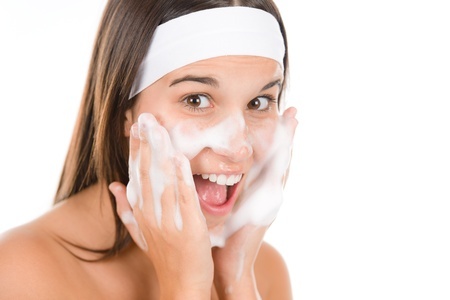Did you ever look forward to that big date or the important job interview only to have a pimple show up the day of the big event? This uninvited guest has the power to sap your self-confidence and make you so self-conscience that it’s ruining your big day.
Acne is the most common skin condition in the United States and it is not limited to teenagers. In fact, the number of adults with acne is actually growing, especially among women between the ages of 30-55 years old. Although the reasons for the increase in adult acne are unknown, dermatologists understand that adult acne can be especially frustrating. Treating acne not only reduces the condition itself, it can boost your confidence and self-esteem.
Acne signs
Acne is not limited to pimples. Acne blemishes include blackheads, whiteheads, papules, pustules (pimples), cysts, and nodules. Signs of acne can appear on the face, neck, chest, back, shoulders, upper arms, and buttocks.
It may cause low levels of self-esteem: Many people with acne, especially during sever outbreaks; say it makes them feel bad about themselves. Some claim they do not want to be with friends, acquaintances, and even miss school or work. Such low self-esteem may develop into depression and suicidal thoughts – especially in teenagers. Even small outbreaks can be perceived as ‘bad’ depending on the individual.
As areas of of your skin heal, dark spots can appear that can take months or years to disappear. Cysts and nodules often leave permanent scars once the acne clears. These scars can be prevented and treatments are available to have them removed after healing. Speak to your dermatologist for treatments available to prevent and treat scaring.
Who gets Acne?
Acne does not have to be a rite of passage into adulthood, however, 40 to 50 million Americans have acne at one time or another during their teenage years. Although the most common sufferers of acne are teenagers or young adults, acne can occur at any age – even newborn babies can get acne. Most of us can get reoccurring acne outbreaks well into adulthood. Some women get severe acne when they reach their 30s and 40s and which may last into their senior years.
Most people who have mild acne have a few blemishes, which may include whiteheads, blackheads, papules, and/or pustules (pimples). There are many over-the-counter scrubs for the prevention and treatment of acne. A product containing benzoyl peroxide or salicylic acid often clears the skin however, despite TV claims; this does not mean that the acne will clear overnight.
What causes Acne?
Acne appears when a pore in our skin clogs with dead skin cells. Typically, dead skin cells rise to the surface of the pore and are shed through normal washing. When the body starts to make lots of sebum (oil that keeps our skin from drying out), dead skin cells can stick together inside the pore. Instead of rising to the surface, the dead skin cells become trapped inside the pore and mix with bacteria that live on our skin, clogging the pore with infection. Once inside the pore, the bacteria have a perfect environment for multiplying very quickly causing the pore to become inflamed, red and swollen. If the inflammation goes deeper into the skin, an acne cyst or nodule may appear.
Treatments
There are a number of effective treatments for acne. Although not every acne treatment works for everyone, it does mean that virtually every case of acne can be controlled. Once acne clears, continued treatment is required to prevent breakouts.
Letting acne runs its course is not advised. Acne can be hard to control and without proper treatment, dark spots and permanent scars can appear on the skin as acne outbreaks begin to clear.
Unfortunately, if you have a lot of acne, cysts, or nodules, over-the-counter medicines may not be effective and you should see a dermatologist if you want to see clearer skin.
Your dermatologist may prescribe topical treatments to help kill the bacteria or reduce the oil produced through your pore. Topical medicine may contain a retinoid, prescription-strength benzoyl peroxide, antibiotic, or even salicylic acid. Your dermatologist will determine your specific needs.
Tips
1. Keep your skin clean. Washing your face or skin area with acne in the morning and evening can help combat further breakouts. There are many over-the-counter options with benzoyl peroxide or other bacterial cleansers that can be used on your face. When you exercise or if you are perspiring frequently, take the time to clean your skin during the day. It pays off!
2. Hydration helps! Keeping your body properly hydrated with water can help your system. The hydration keeps all your bodily functions working optimally and helps your body eliminate toxins and impurities. Give it a chance!
3. Wear sunscreen! If you are outside frequently, make sure you wear a proper sunscreen on your skin. If your skin overheats and burns, acne can begin to form because of the clogged pores.
4. Consult your doctor! Your medical professional can give you medical advice about your particular acne and what medications can help control your breakouts. It may be an over-the-counter solution or a prescription drug. Always follow your medical professional’s recommendations so that your get adequate treatment and don’t overuse the medication.
There are certain acne treatments that work throughout the body, which is usually necessary to treat acne cysts and nodules. Your dermatologist may prescribe one or more of these medications:
1. Antibiotics to help kill bacteria and reduce inflammation
2. Birth control pills and other medicine that work on hormones
3. Other procedures to treat acne include:
4. Lasers and other light therapies to reduce the p. acnes bacteria. Your dermatologist may recommend limited exposure to sun light for instance
5. Chemical peels to treat blackheads and papules and remove excess dead skin
6. Acne removal: a procedure called “drainage and extraction” removes large acne cyst when the cyst does not respond to medicine. It also helps ease the pain and the chance that the cyst will leave a scar. To remove a cyst quickly, your dermatologist may inject the cyst with medication.
The Best Outcome
See your dermatologists for recommendations to properly treat acne. Treatments are available for the prevention and healing of acne.
Common Medications to treat Acne
| DRUG NAME |
| Amethia oral |
| Apri oral |
| Aviane oral |
| Azurette (28) oral |
| Beyaz oral |
| Claravis oral |
| clindamycin HCl oral |
| Cryselle (28) oral |
| Doryx oral |
| doxycycline hyclate oral |
| doxycycline oral |
| Epiduo topical |
| Femcon Fe oral |
| Generess Fe oral |
| Gildess FE oral |
| Jolessa oral |
| Junel FE 1.5/30 (28) oral |
| Junel FE 1/20 (28) oral |
| Kariva (28) oral |
| Lo Loestrin Fe oral |
| Loryna (28) oral |
| Lutera (28) oral |
| Microgestin FE 1/20 (28) oral |
| Minastrin 24 Fe oral |
| minocycline oral |
| Mononessa (28) oral |
| Natazia oral |
| Necon 1/35 (28) oral |
| Ocella oral |
| Ortho Tri-Cyclen (28) oral |
| Ortho Tri-Cyclen Lo (28) oral |
| Ortho-Cyclen (28) oral |
| Quasense oral |
| Reclipsen (28) oral |
| Seasonique oral |
| Solodyn oral |
| Sprintec (28) oral |
| Sronyx oral |
| Tri-Previfem (28) oral |
| Tri-Sprintec (28) oral |
| TriNessa (28) oral |
| Viorele (28) oral |
| Yasmin (28) oral |
| YAZ (28) oral |
Acne medications can be expensive and many are not covered through insurance due to the cosmetic nature of some of them. If you do not have insurance coverage or your insurance company does not cover your medication, you can get prescription drug discounts by using our free Easy Drug Card prescription drug card, including Isotretinoin discounts and more.
Our free prescription savings card provides discounts at over 65,000+ pharmacies. Download a card to your printer or use our free app to begin saving today. There are no limitations or restrictions to use our discount drug program.













